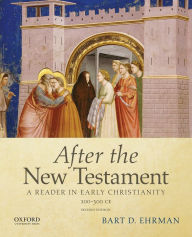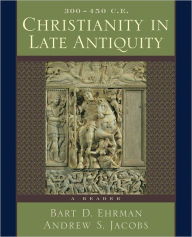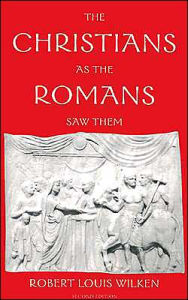
COURSE DESCRIPTION
This course will examine the origins and development of Christianity in
the first five centuries C.E., beginning in the period following the
time of Jesus and the apostles. We will focus on primary (ancient)
texts in order to understand the social, cultural, political and
theological dynamics of this formative religion. We will pay special
attention to the ways that difference is established, performed, and
contested in the context of the Roman Empire. No previous knowledge of
antiquity or Christianity is required or expected.
COURSE LEARNING OUTCOMES
By the end of this course students will be able to:
1. Explain the multiple ways that
"religious" distinctiveness can be enacted;
2. Place Christian ideas and practices in the distinct social,
political, and cultural contexts of the Roman Empire;
3. Analyze modes of expression, debate, difference, and dissent in
multiple written formats using examples from the first Christian
centuries.
COURSE MATERIALS
The following REQUIRED BOOKS
should be available for sale or rental from the Huntley Bookstore (but
you can get them wherever you want), and on reserve at Honnold-Mudd:

1. Bart D. Ehrman, After the New
Testament, 100-300 C.E.: A Reader in Early Christianity, 2d ed.
(New York: Oxford University Press, 2014)

2. Bart D. Ehrman and Andrew S. Jacobs, Christianity in Late Antiquity, 300-450
C.E.: A Reader (New York: Oxford University Press, 2003)
The following RECOMMENDED BOOK
should also be available from the bookstore:

Robert Wilken, Christians as the
Romans Saw Them, 2d ed. (New Haven: Yale University Press, 2003)
Additional readings can be found on electronic reserve through Sakai or
directly on the course website, accessible through the Syllabus &
Readings page.
COURSE REQUIREMENTS
1. Participation and attendance:
15%. You are required to attend class; more than four absences
may result in a lowering of your participation grade. Because of the
small size of this class, it will be conducted like a seminar: your
conversations (supplemented with brief “mini-lectures” by the
professor) will drive the class.
2. Written assignments (15%
per assignment; 60% total). Full descriptions of each written
assignment are found on the Written
Assignments page,
and will be discussed thoroughly in class before due dates. For each
assignment you will have several choices, and you should be keeping
these assignments in mind as you complete the readings each week. All
written assignments will be turned in (and returned) through Drop Box
on Sakai. Any written assignment that receives below a B+ can be
revised and turned in for regrading. Students
planning to revise papers should meet with the professor to discuss revisions. (Links below take you to full descriptions of the
assignments.)
a. Directed Reading. In this
assignment, you will closely read a primary text and trace its use of
specific themes and ideas.
b. Creative Response. In this
assignment, you will produce a creative text in the "voice" of an early
Christian along the lines of a specific early Christian theme.
c. Argument Analysis. In this
assignment, you will attempt to analyze and produce "counterarguments"
to a specific argumentative primary text.
d. Film Analysis. In this
assignment, you will analyze specific tropes and themes from the film
Agora and contemplate the ongoing appeal of early Christian in modern
popular culture.
3. Final exam: 25%. The final
is cumulative (i.e., it covers the entire semester) and will ask you to
explain significant persons, places, and ideas as well as discuss
broader thematic questions in essay format. The final exam will be take
home, and due on the scheduled day of the final exam (Monday, December
12, 2016), at 5pm (uploaded to the DropBox on Sakai).
Student accommodations: Students requiring academic accommodations should contact the appropriate person in their Dean of Students office in order to formalize accommodations (be ready to discuss appropriate accommodations and provide necessary documentation). Accommodations may not be provided for students who have not registered through their Dean of Students Office.
College accommodations contact information:
Scripps - Academic Resources and Services, ars@scrippscollege.edu
CMC - Julia Easley, julia.easley@claremontmckenna.edu
Pitzer- Jill Hawthorne, Jill_Hawthorne@pitzer.edu
Pomona - Dean of Students Office, disabilityservices@pomona.edu
Harvey Mudd – Office of Disability Resources, ability@hmc.edu
Scripps College’s policy on academic
honesty:
“Cheating and/or plagiarism seriously violate the principles of
academic integrity that Scripps College expects its students to uphold.
Academic dishonesty is not tolerated at Scripps and may result in
suspension or expulsion from the College. (See the current Guide to
Student Life, pp. 90-93.)”
IMPORTANT DATES
Mark your calendars!
September 23: Directed Reading due by 5pm
October 21: Creative Response due by 5pm
November 11: Argument Analysis due by 5pm
December 5: Take-home final available to download from Sakai (12 noon)
December 9: Film Analysis due by 5pm (note new due date!)
December 12: Take-home final exam due (5pm)
Return to home page



